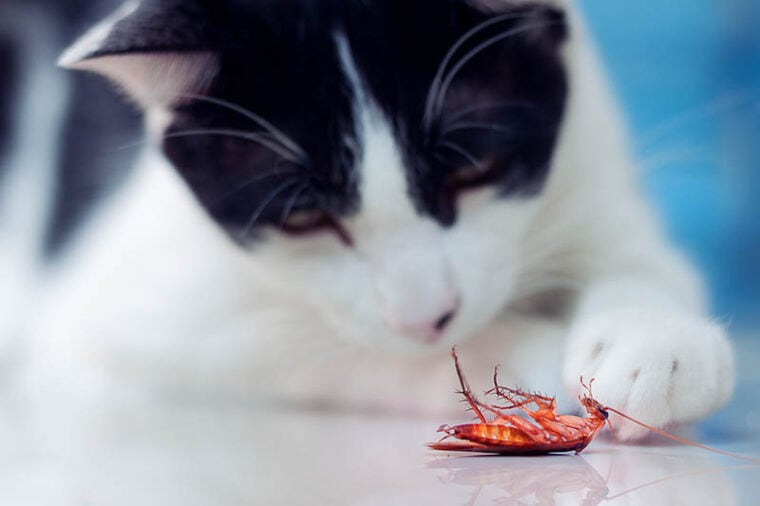
Cats are natural predators! They love to stalk, pounce and dominate small critters. Most cats are intrigued by anything small and wiggly, with spiders, ants, and crickets often drawing their attention. But what if the hunt is successful, and your buddy manages to eat a cockroach?
Chances are your cat is going to be just fine. Cockroaches aren’t toxic to cats, but they can carry diseases and parasites that cause problems. Also, the hard cockroach exoskeletons can get stuck in your cat’s mouth, throat, or stomach, which can be quite painful. Read on for more information about what to do if your cat eats a cockroach.
What Should I Do Now?
Because these insects aren’t toxic to cats, you don’t need to spring into action the minute you realize your buddy’s eaten a roach. Cats that eat too many insects or end up with a piece of exoskeleton stuck in their digestive systems often have upset stomachs or diarrhea. These gastrointestinal issues usually clear up on their own within a few days.
Keep in mind that cats often catch parasites, specifically Physaloptera worms, by eating roaches. Signs of a worm infection include vomiting and diarrhea, but they sometimes take a bit of time to develop. Veterinarians can diagnose the presence of worms in cats by looking for parasite eggs in your cat’s stool.
Some pet parents worry about toxic exposure if their cat munches on a roach exposed to an insecticide. Veterinarians suggest there’s not much to worry about if your pet takes a few bites of a pesticide-laden insect—there’s simply not enough poison in the roach’s body to harm your cat.
Is It OK for My Cat to Eat Cockroaches?

Cats chase bugs, including cockroaches, because it’s part of that feline hardwiring that makes kitties so adorable, but that doesn’t mean that it’s healthy for cats to eat insects. Cockroaches carry parasites and bacteria, including the ones responsible for salmonella, staphylococcus, and streptococcus infections. They can also be vectors for the transmission of diseases such as typhoid fever, diarrhea, dysentery, and cholera in humans.
How Do I Get Rid of Cockroaches?
Cockroaches are notoriously difficult to kill. Hiring a professional exterminator is often the best way to eliminate a roach infestation effectively. But there are other steps you can take that can reduce the chances of cockroaches making a home in your kitchen. Experts recommend fixing leaky pipes and sealing exterior holes as a start. Make sure to keep indoor and outdoor trash well-covered and store food in airtight containers. You should also wash your pet’s food bowl immediately after use and avoid leaving food out for your cat to munch on all day.
Is Professional Pest Control Safe for Cats?

Most professional extermination companies use low concentrations of pesticides delivered through spray applicators. The concentration of toxins in the pesticides professional exterminators use is high enough to kill insects and low enough not to harm you or your cat.
The pesticides these companies use evaporate pretty quickly, so you don’t need to be worried about your pet breathing tainted air after the exterminators come. Keep any pets in a separate home or building while the exterminator is doing their work. Expect to wait at least 1 or 2 hours after the application of any insecticide before allowing your cat into any recently treated rooms.
What About Bait Traps and Sprays?
Bait traps and store-bought sprays often seem like great options when you’re trying to get rid of cockroaches. They’re often the first products people turn to after seeing a nasty scurrying critter in the kitchen. Unfortunately, these products are often toxic to cats and should be used only after taking a few solid precautions.
Today’s bait traps often contain boric acid, which won’t harm your pet if they take one of two licks but can cause serious problems if too much is consumed. Since cats will eat just about anything, including the bait trap housing, it’s often best to put these products in places your pet can’t get to.
Insect sprays you purchase at the garden center can also be problematic, as many contain chemicals such as permethrin and pyrethrin, which are highly toxic to cats. Signs your cat may be suffering from permethrin or pyrethrin poisoning include lethargy, vomiting, diarrhea, and seizures. Contact your veterinarian immediately if you suspect your pet has ingested or been exposed to roach spray.
How Common Are Cockroaches?

There are currently more than 4,600 species of cockroaches, although only about 30 of those are drawn to environments where they’re likely to encounter humans.
Common North American variants of the insect include American, German, Oriental, and brown-banded cockroaches. The United States Environmental Protection Agency (EPA) classifies roaches as pests. These adaptable creatures can be found on every continent except Antarctica and can withstand anywhere from six to 15 times more radiation exposure than humans. Roaches will eat just about anything they can get their hands on, including leather, paper, glue, skin flakes, and air.
Conclusion
If your cat eats a cockroach every now and then, there’s generally nothing to worry about. Roaches aren’t toxic to cats, so there’s no reason for you to worry about your buddy getting seriously ill after eating one. Cats that eat too many roaches can sometimes have tummy problems, as can pets that end up with part of the insect’s hard exoskeleton lodged inside their digestive tract.
If your cat eats a cockroach, reach out to your veterinarian if your pet begins to vomit, has loose bowels, or things don’t improve on their own in 2 or 3 days.
Featured Image Credit: Amonrat Joysampao, Shutterstock







